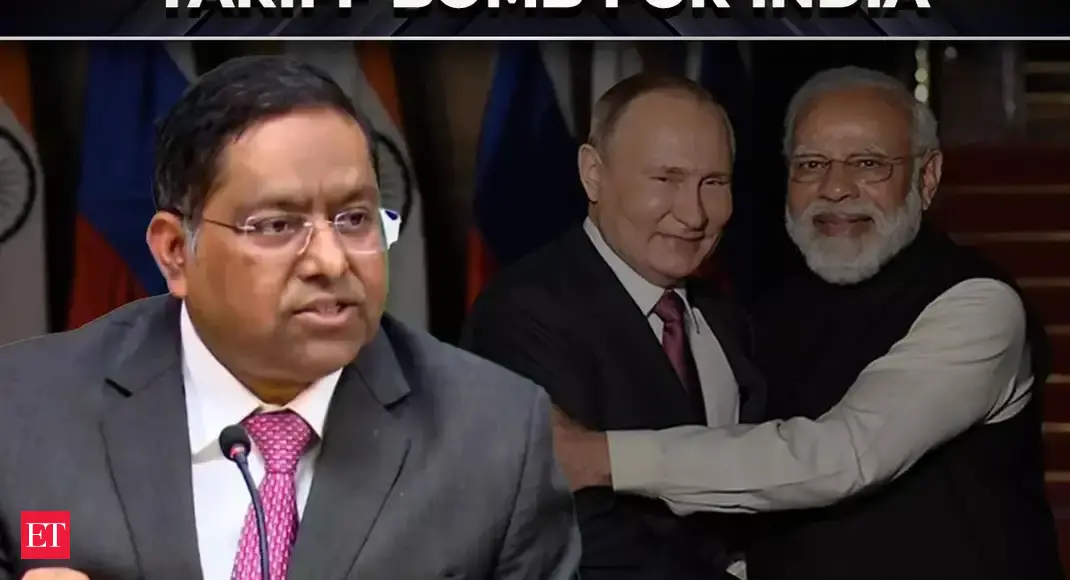

India's Ministry of External Affairs (MEA) has responded to recent trade actions and criticisms from the United States, asserting the strength and independence of its bilateral relationships, particularly with Russia. This comes in the wake of U.S. President Donald Trump's announcement of a 25% tariff on Indian imports, effective August 1st, along with a yet-to-be-specified "penalty" related to India's energy and military acquisitions from Russia.
MEA spokesperson Randhir Jaiswal addressed the situation, emphasizing that India's relationships with other countries stand on their own merit and should not be viewed through the lens of a third country. He stated, "Our bilateral relationships with various countries stand on their own merit and should not be seen from the prism of a third country. India and Russia have a steady and time-tested partnership". Jaiswal also highlighted the comprehensive global strategic partnership between India and the United States, "anchored in shared interests, democratic values, and robust people-to-people ties". He expressed confidence that this relationship would continue to move forward, having "weathered several transitions and challenges".
Trump's decision to impose tariffs on India stems from concerns over the U.S. trade deficit with India, which stood at $45.7 billion in 2024, a 5.4% increase from the previous year. The U.S. also views India's agricultural subsidies and sanitary measures as trade barriers. Furthermore, Trump has criticized India's relationship with Russia, particularly its energy and defense cooperation, at a time when the U.S. and other Western nations are seeking to isolate Russia economically due to the ongoing war in Ukraine. Trump has also expressed his disapproval of India's membership in BRICS, viewing the bloc as an anti-dollar alliance that challenges American economic dominance.
Despite these concerns, India has maintained its stance on its relationship with Russia, emphasizing its importance for national security and strategic interests. Russia has been a long-standing partner of India, particularly in the areas of defense, energy, and civil nuclear cooperation. India is the second largest market for the Russian defense industry. In recent months, Russia has become India's top oil supplier, accounting for a significant portion of its imports. This increase in oil imports from Russia has been driven by discounted prices offered by Russia in the wake of Western sanctions.
The MEA has stated that India's energy sourcing decisions are guided by "what is available in the market and by prevailing global circumstances". India has also defended its energy deals with Moscow, citing national interest and energy security. Union Commerce and Industry Minister Piyush Goyal stated the government is closely examining the developments and will safeguard national interests.
The imposition of tariffs by the U.S. is expected to have a significant impact on India's exports. Experts predict a potential decrease in India's goods exports for FY 2026. Sectors such as pharmaceuticals, gems and jewellery, textiles, and automobiles are likely to be most affected. However, certain categories of products, including pharmaceuticals, energy products, and electronics, may be exempted from the tariffs.
Despite the challenges posed by the U.S. tariffs and criticisms, India remains committed to maintaining its strategic autonomy and pursuing its national interests. The MEA has emphasized the importance of the India-U.S. partnership and expressed confidence that it will continue to move forward. India has also reaffirmed its "steady and time-tested partnership" with Russia, emphasizing that its bilateral relationships are independent and based on their own merits. Bilateral trade between India and Russia reached a record high of USD 68.7 billion in FY 2024-25. Both sides expect to reach the bilateral trade target of USD 100 billion by 2030.